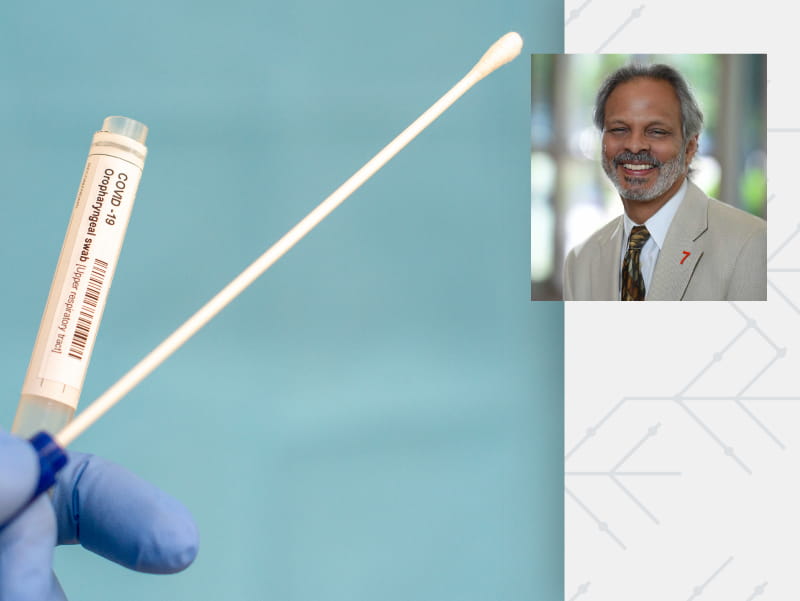COVID-19 science: Why testing is so important
By Dr. Eduardo Sanchez, American Heart Association Chief Medical Officer for Prevention

Dr. Eduardo Sanchez is the American Heart Association's chief medical officer for prevention and a former state health commissioner of Texas. He has dealt with major public health crises, including the SARS outbreak. In this occasional series, he offers his insights into various topics related to the coronavirus pandemic.
When a communicable disease outbreak begins, the ideal response is for public health officials to begin testing for it early.
That leads to quick identification of cases, quick treatment for those people and immediate isolation to prevent spread. Early testing also helps to identify anyone who came into contact with infected people so they too can be quickly treated.
While we are obviously not in that ideal situation with COVID-19, testing remains critical.
It's crucial of course to help treat, isolate or hospitalize people who are infected. Testing also is important in the bigger public health picture on mitigation efforts, helping investigators characterize the prevalence, spread and contagiousness of the disease.
In comparison to China and South Korea, testing in the United States appears to have been insufficient for optimal early containment. And now we're seeing a rapid rise in hospitalizations that is overwhelming public health systems and clinical care systems.
These systems, lacking vital equipment to test and provide timely results and staff to address "positives," are now bracing for more and more critically ill patients in the coming days and weeks.
A big part of the problem is the inability to conduct "contact investigations." These investigations involve figuring out everyone an infected person may have been in contact with. This requires a lot of time and labor – two resources that just aren't available in a strained system. It's easy to see how quickly cases can spread without information from contact investigations.
Another important kind of test is one that determines if a person has already had COVID-19. When a person is infected with a novel virus such as SARS-CoV-2 (the scientific name for this specific coronavirus), the person's immune system has never "seen" that virus before. As the virus reproduces, it causes manifestations of disease – fever, cough and so on – and triggers an immune response.
The immune response is how the body fights the virus and protects itself. The immune system activates, produces and mobilizes a variety of protective cells and molecules that attack the "foreign" virus. The immune system will recognize the virus after that and protect the person by destroying it if it returns.
The key to that protection is the work of molecules called antibodies. When tests turn up the presence of disease-specific antibodies, it's considered evidence of past exposure and infection. While the no-longer-infected person is out of danger, the information about past infection status is extremely valuable.
Confirming that someone has had the disease and is now immune helps public health officials and others understand the level of immunity in a population. A high percentage of people with immunity adds to "herd immunity," which protects the larger community.
Knowing who has been infected also is important because people with immunity from COVID-19 can safely work in essential settings such as health care, public safety and the service industry. They also can work in "non-essential" settings with less need for extreme personal protection.
Furthermore, for clinical care, testing for seroconversion – the technical name for the process of going from non-infected to infected to immune – can identify people whose plasma contains COVID-19-specific antibodies.
This plasma could, theoretically, be used for infusions to treat the disease and prevent its severe complications. Use of such plasma, called convalescent plasma, is not new. In fact, it was a treatment approach during the 1918 flu pandemic.
The Food and Drug Administration is currently accepting requests from researchers who want to study the use of COVID-19 convalescent plasma.
When we look back at what will be the first wave of COVID-19 in the United States, testing data will help us develop a full picture of the epidemiology and course of this disease. The data can provide important puzzle pieces for stopping or slowing the disease in the future.
Editor's note: Because of the rapidly evolving events surrounding the coronavirus, the facts and advice presented in this story may have changed since publication. Visit Heart.org for the latest coverage, and check with the Centers for Disease Control and Prevention and local health officials for the most recent guidance.
If you have questions or comments about this story, please email [email protected].





